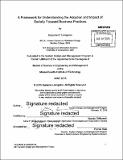A framework for understanding the adoption and impact of socially focused business practices
Author(s)
Livingston, Suzanne O
DownloadFull printable version (8.313Mb)
Other Contributors
System Design and Management Program.
Advisor
Wanda Orlikowski.
Terms of use
Metadata
Show full item recordAbstract
Two trends have emerged where technology plays a dominant role in aiding organizations to meet their goals. The first is a trend where organizations are engaging customers in developing business strategy. The second is a trend where organizations are discovering, promoting, and adapting to process efficiencies. These two trends have influenced the creation of new collaborative technologies that encourage knowledge sharing. Also known as social software, these technologies have been adopted by organizations aiming to better connect with external stakeholders and communicate business practices organization-wide. Organizations have also invested in their own social platforms, enabling them to host conversations, gather ideas, and communicate messages, among other capabilities. Organizations are making investments in social technologies to support their goals. However, many organizations struggle to understand the impact of these investments in practice. There are two challenges that organizations typically face when understanding the impact of social technology. One challenge is that they often struggle with user adoption, and as a result, there is insufficient usage to demonstrate improvement or impact. Another challenge is that there is no existing basis upon which the organization can compare performance with and without social technology.
Description
Thesis: S.M. in Engineering and Management, Massachusetts Institute of Technology, Engineering Systems Division, System Design and Management Program, 2015. Cataloged from PDF version of thesis. Includes bibliographical references (pages 96-99).
Date issued
2015Department
System Design and Management Program.; Massachusetts Institute of Technology. Engineering Systems DivisionPublisher
Massachusetts Institute of Technology
Keywords
Engineering Systems Division., System Design and Management Program.